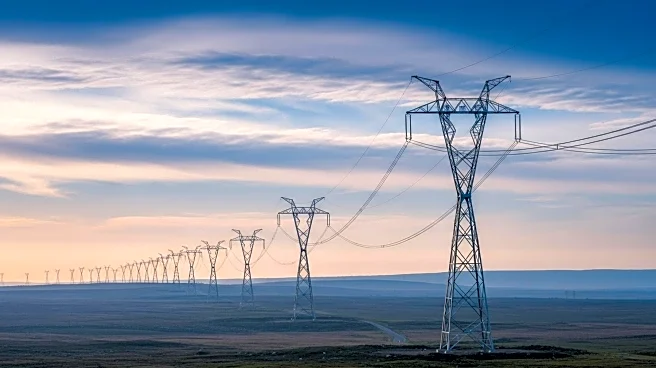What is the story about?
What's Happening?
China is advancing its renewable energy infrastructure with a network of ultra-high-voltage transmission lines, designed to transport electricity over long distances with minimal losses. These lines, operating at voltages up to 1,100 kilovolts, are crucial for moving clean power from inland regions to coastal cities. However, the presence of these massive pylons has raised concerns among local communities living near them. Residents have reported experiencing physical effects, such as numbness when holding umbrellas in the rain or fishing near the lines. Despite these issues, the transmission lines are part of China's broader strategy to reduce greenhouse gas emissions and reliance on fossil fuels, contributing to significant improvements in air quality.
Why It's Important?
The development of ultra-high-voltage transmission lines is a key component of China's renewable energy strategy, which aims to reduce pollution and greenhouse gas emissions. This infrastructure supports the country's transition to cleaner energy sources, potentially serving as a model for other nations. The reduction in air pollution has already led to increased life expectancy in China, highlighting the health benefits of renewable energy. However, the impact on local communities raises ethical and social considerations, as residents face challenges living near these powerful lines. Balancing national energy goals with local community welfare remains a critical issue.
What's Next?
China is likely to continue expanding its network of ultra-high-voltage transmission lines to meet growing energy demands and further reduce emissions. As the country progresses, it may need to address the concerns of affected communities, possibly through technological innovations or policy adjustments. The success of these initiatives could influence global renewable energy strategies, encouraging other countries to adopt similar technologies. Monitoring the long-term effects on local populations and the environment will be essential to ensure sustainable development.
Beyond the Headlines
The ethical implications of China's energy strategy are significant, as the government prioritizes national goals over local concerns. The potential health risks associated with living near high-voltage lines could lead to increased scrutiny and demand for regulatory measures. Additionally, the success of China's renewable energy initiatives may shift global energy markets, affecting international trade and economic relations. The cultural acceptance of such infrastructure in China contrasts with the resistance often seen in other countries, highlighting differences in public perception and policy approaches.

















